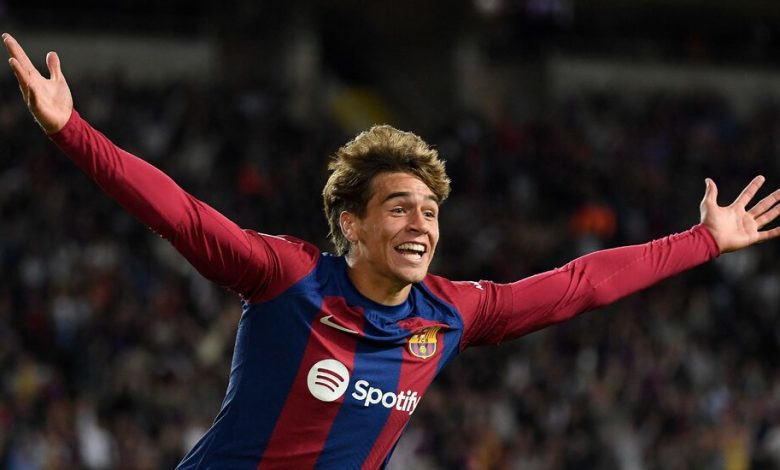At Barcelona, Timing Is Everything

As he rose through the ranks at Barcelona, Gerard Deulofeu seemed to have everything. Above all, he was fast, possessed of that urgent, quicksilver sort of speed that carries with it an air of permanent menace. But he had composure, too, a coolness on the ball, that stood out even at La Masia, Barcelona’s revered academy.
His coaches knew, of course, that no player is a sure thing, but as far as they could tell, Deulofeu stood as good a chance as anyone. He scored buckets of goals for Barcelona’s reserve team, competing in the second tier of Spanish soccer. Luis Enrique, his manager, regarded him as his “standout.” He was fast-tracked into the senior side at the age of just 17.
Deulofeu, though, never quite made it at Barcelona, not really. He spent a year on loan at Everton, to toughen him up, and then another season at Sevilla. He felt Luis Enrique, previously such an ardent advocate, did not “trust” him now that he was in charge of the senior team. There was scrutiny of Deulofeu’s industry, his attentiveness, his work ethic.
Those criticisms were doubtless legitimate, but the real issue Deulofeu faced was less what he was, and more who he was not. In front of Deulofeu in Barcelona’s attacking queue, over the course of those years, were (in no particular order): Lionel Messi, Neymar, Luis Suárez, Cesc Fàbregas, Alexis Sánchez and Pedro. Andrés Iniesta could always fill a gap, too. Deulofeu played six times for Barcelona, and was sold.
He was not alone in suffering that fate. In the club’s years of plenty, an apparently endless supply of prodigies rattled off the Barcelona production line. There was Cristian Tello and Isaac Cuenca and Adama Traoré and, because they were not all wingers, Marc Bartra and Rafinha and Martín Montoya.
Like Deulofeu — now an alumnus of A.C. Milan, Udinese and Watford — they have mostly gone on to build respectable careers in Europe’s elite leagues. Tello played for Porto and Fiorentina. Bartra had a spell at Borussia Dortmund. Montoya spent two seasons at Valencia. For reasons that are not entirely clear, many of them seem to have joined Real Betis at one point or another.
No matter their early promise, though, none of them proved quite good enough for Barcelona. That, certainly, is how they are remembered, perhaps even how they will remember themselves, in time: that they fell just short, were in some way lacking. But that does not mean it is precisely what happened.
Last week, Marc Guiu made his debut for Barcelona. He is 17, just as Deulofeu was when he was first summoned to the field for his boyhood team. Almost immediately, he picked up a pass from Joao Félix. He brought it under control with his left foot, and then swept a shot past Unai Simon, the Athletic Bilbao goalkeeper, with his right. He had been on the field for 23 seconds.
Guiu’s case is, obviously, extraordinary — he is both the youngest and the fastest debutante to score a league goal for Barcelona. But it also felt, somehow, fitting. The Barcelona team that will host Real Madrid in the first Clásicoof the season on Saturday is one filled with youth. Alejandro Baldé, 20, is now the default left back for both his club and Spain. The midfield has been constructed around Gavi (19) and Pedri (20). Fermín López, another 20-year-old, scored in this week’s 2-1 win against Shakhtar Donetsk in the Champions League.
And then, of course, there is Lamine Yamal, the 16-year-old who has spent the last six months making it almost comically easy to remember who holds basically every age-related record in Spanish soccer.
Yamal is now the youngest player to play for Barcelona in La Liga, the youngest player to start for Barcelona in La Liga, the youngest player to create a goal in La Liga, the youngest player to score in La Liga, and the youngest player to start a game in the Champions League. An unhelpful comparison: At the same age, Messi was still trundling about with Barcelona’s third team.
Soccer is, of course, a results-oriented business. It is inclined to wait for an outcome before it reverse-engineers an explanation. By that logic, the difference between these two clutches of players is obvious. Yamal and his cohort are simply more talented than the generation that emerged from Barcelona’s youth ranks a decade or so ago; it follows, then, that La Masia must have rediscovered its magic touch.
It should be remembered, though, that talent is only one of the ingredients that goes into the whether any given player makes it or not. Attitude, coaches will tell you, is just as important. Nobody is in any doubt that luck — particularly the good fortune to avoid serious injury — plays a role, too.
But none of them are relevant without opportunity, and opportunity, in this context, tends to arise from crisis. The Barcelona team that Deulofeu and his peers were trying to break into contained some of the finest players of their generation. It won the Champions League three times in seven years, and probably should have won more. It is, rightly, remembered as one of the finest club teams in history. Its golden age spanned a decade, perhaps more. It was not a place, in other words, where young players could cut their teeth.
The Barcelona of today, by contrast, the one that has granted opportunity to Yamal and the others, is a force diminished. Its parlous finances have forced all but a handful of its greatest generation to leave. Its plan — mortgaging its future for immediate success — might kindly be described as a moderate success, but it left the club with little choice but to turn to youth to fill the gaps.
It is heartening to believe that a player like Yamal — and certainly the likes of Gavi and Pedri — would have come through at any time, in any context. So shimmering is their ability, they stand as proof that talent always wins out, that there is such a thing as a player who is destined to break through.
But it is hard to believe that López, say, or Guiu, would have been given the chance had it not been for the circumstances in which Barcelona has found itself, that they would have been able to establish themselves if they had Iniesta or Suárez or any of the others standing in their way.
The same could be said of La Masia’s most famous graduates, of course: They, too, emerged just at the moment when Barcelona needed them most. That is not a coincidence. Opportunity tends to have its roots in crisis. Deulofeu and his generation did not lack talent, not necessarily. They just had their timing all wrong.
Judging the Judges
Let’s go through this quickly, one more time, just in case anyone is not quite clear on the principle. It will not be disgraceful if — when — Lionel Messi wins an eighth Ballon d’Or in Paris on Monday. It will not be an outrageous slander committed against Erling Haaland’s person and dignity.
It will not be proof that the jury that hands out the most prestigious individual prize in soccer has not been paying attention, or does not give sufficient weight to England’s domestic cup, or is biased against either Manchester City or granite-hewn manifestations of the god Odin.
Yes, there is a compelling case that Haaland was last season’s outstanding player, his 52 goals in 53 games crucial in Manchester City’s conquest of the Premier League, the F.A. Cup and the Champions League. But those trophies are not a sort of labyrinthine qualifying process for the Ballon d’Or. The prize for winning the treble is winning the treble.
And besides, there is also a compelling case that Messi’s achievement — steering Argentina to its third World Cup title, and his first — was the more complex, the more startling, the more emotive. Yes, the prize for winning the World Cup is winning the World Cup, but the manner and the context of Messi’s triumph are not irrelevant. Qatar, after all, was his last shot, his final act, and by sheer force of will, he transformed it into his crowning glory.
Rather than getting riled about that, it would be a far better use of everyone’s time to keep a very close eye on the women’s award. There is something of a tendency for individual prizes in women’s soccer to go either to a legacy candidate — Carli Lloyd or Marta, say — or to the most familiar name on the ballot sheet.
This year, though in some ways it would be appropriate for Jenni Hermoso to win, it is hard to believe anyone has a better claim than Aitana Bonmatí. She does, after all, have a Spanish title, a Champions League and a World Cup to her name. Her candidacy is, to some extent, a test of how much the judges have been paying attention.




